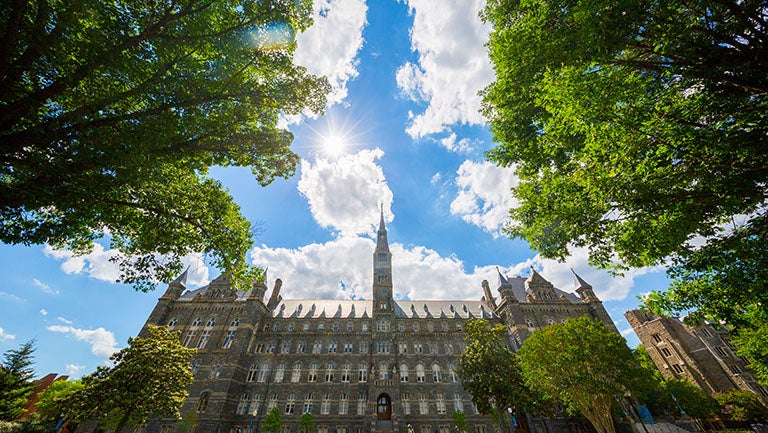Title: Board of Directors Approves Five-Year Financial Plan at Winter Meeting
The board of directors approves a five-year financial plan designed to strengthen the university’s competitiveness, maintain its financial stability and continue its commitment to the broadest possible access to a Georgetown education.

The board of directors approved a five-year financial plan this week designed to strengthen the university’s competitiveness, maintain its financial stability and continue its commitment to the broadest possible access to a Georgetown education.
In addition to implementing cost-saving measures, the 2019-2022 financial plan includes renovations of student housing and an increase in financial aid.
Financial aid is expected to rise to nearly $209 million for FY2019.
One of only a handful of colleges and universities that maintains need-blind, full-need admission and financial aid policies for its undergraduates, Georgetown meets the full need of eligible students – regardless of their ability to pay – through a combination of grants, work-study and loans.
New Investments
Investments in the financial plan include major renovations to 19 apartments covering 76 beds in Alumni Square, the 90-apartment complex located just outside the campus. Last year, 15 Alumni Square apartments were also fully renovated.
Upgrades to numerous campus facilities are prioritized in the five-year plan as well as continued exploration of temporary repairs to Kehoe Field, which sits atop Yates Field House.
The plan also includes an additional $9 million over fiscal years 2019, 2020 and 2021 to replace network equipment and improve wireless services throughout all buildings on the Main and Medical Center campuses as part of the Verizon Strategic Partnership that began in FY2017.
Cost-Cutting Measures
In order to minimize tuition increases, Georgetown is implementing cost-cutting measures that reduce costs for the university while maintaining its status as a top employer in the region.
In keeping with many of Georgetown’s peer academic institutions and the D.C. job market, Georgetown’s Defined Contribution 403(b) Retirement Plan is changing to include a one-year waiting period for new employees to receive a matching contribution of 5 percent of their salaries per year when they contribute 3 percent.
A two-year waiting period has been established for an additional core contribution of 5 percent regardless if the employee is contributing 3 percent. If an employee contributes, he or she will be provided a total of 10 percent university contribution.
Other cost-cutting measures include a new managed travel spending program and a re-negotiating of copying and office supply contracts. The changes are expected to provide significant savings to the university.
Tuition Numbers
The undergraduate tuition approved for 2018-2019 is $53,520, a 3.5 percent increase over last year. The full cost of undergraduate tuition, room and board and fees comes to $70,583 for 2018-2019.This comprises tuition at $53,520; room at $10,582; a meal plan at $5,897; and activity/recreation fees of $584.
While Georgetown’s cost of attendance is similar to most of its peer institutions, the high cost of living in D.C., reflected in room and board rates, contributes to the higher attendance cost.
Tuition at the Graduate School of Arts and Sciences will also rise 3.5 percent for the next academic year, with tuition at the School of Medicine rising by 2.2 percent. Georgetown Law tuition for full-time J.D. students will increase by 4 percent, which is also consistent with its peer institutions.
New Program, Science Requirement
The board also approved a new certificate and master of arts degree in Catholic Clinical Ethics; a new natural science requirement for undergraduate students; and a board committee on mission and identity.
The new joint certificate and master’s program, to be offered this fall by the School of Medicine and The Catholic University of America in collaboration with the Catholic Health Association, is designed to provide practitioners with ethical reasoning skills and knowledge of medical moral terrain to address Catholic health care ethical challenges.
Beginning in fall 2019, all undergraduates entering Georgetown will be required to take a course in the natural sciences, drawing on such fields as biology, chemistry, physics, the cognitive and neuroscience branches of psychology and/or interdisciplinary fields such as environmental sciences.
The change is based on a recommendation from faculty and academic leadership.
The new committee on mission and identity has been created to strengthen and expand opportunities for all senior leaders and board members to gain a deep understanding of the university’s Catholic and Jesuit heritage and mission.